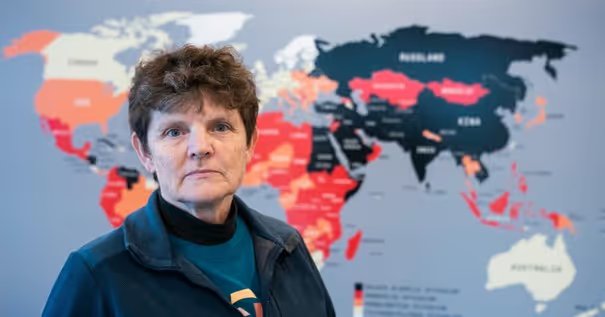Norway’s 2025 refugee resettlement quota is full: What does it mean for ICORN’s work?

On June 18, 2025, The Norwegian Directorate for Immigration (UDI) informed ICORN and Norwegian PEN, who coordinate the Norwegian ICORN programme together, that the refugee resettlement quota for 2025 is full. This means that new cases of writers, artists, and journalists at risk cannot be submitted to the UDI and that Norwegian ICORN Cities of Refuge will be unable to invite new ICORN residents until 2026.
Norway’s refugee resettlement quota has consisted of a total of 500 places in 2025, most of which are reserved for groups of refugees in selected countries resettled through the United Nations Refugee Agency (UNHCR). 50 of the 500 places are available through a more flexible open quota and can be used for resettlement referrals by other organisations, including ICORN and Norwegian PEN.
The Norwegian Parliament (Stortinget) determines the size of the overall refugee resettlement quota and The Ministry of Justice and Public Security controls the size of the open quota. The overall quota was reduced from 3 000 in 2022, down to only 500 in 2025, and the open quota was reduced proportionately. ICORN and Norwegian PEN continue lobbying to reverse this trend in 2026 and beyond.
What does this mean for ICORN Cities of Refuge in Norway?
With 26 Norwegian ICORN Cities of Refuge, these changes have had implications on the number of writers, artists, and journalists at risk who can be invited to an ICORN residency in Norway. In 2025, only five Cities of Refuge in Norway have been able to invite a would-be ICORN resident and their family members- a total of 16 individuals to arrive in 2025.
For comparison, 2024 saw 11 writers, artists, and journalists at risk and their families arrive in Norway. This was a total of 31 people from Iraq, Afghanistan, Iran, Bangladesh, Syria, Sudan, Eritrea, Myanmar, and Palestine (Gaza).
At present, there are eight other Cities of Refuge in Norway who are ready to host a writer, artist, or journalist through the ICORN programme. Three of these have already selected and invited a new ICORN resident. As the open quota is nearly full, the UDI will be unable to process any more cases in 2025. Inviting Cities of Refuge will need to wait until 2026 to continue their work in protecting and promoting freedom of expression, democratic values, international solidarity, and culture locally and globally.
On June 23 2025, Member of Parliament Birgit Oline Kjerstad (SV) submitted a question on the issue to the Minister of Justice and Public Security Astri Aas-Hansen (AP). Kjerstad asked what the Minister of Justice can do to ensure that Norwegian ICORN Cities of Refuge can continue to provide protection to writers, artists, and journalists at risk. You can read Aas-Hansen’s answer here.
Writers, artists, and journalists currently and previously in ICORN residencies in Norway have also shared their reflections on the reduction of the refugee resettlement quota and its impact on global freedom of expression. You can find out more here and here.
On 29 July 2025, ICORN’s Programme Director Elisabeth Dyvik featured in an interview with the newspaper Stavanger Aftenblad where she discussed the consequences of the quota’s reduction. You can read the article here.
What does this mean for writers, artists, and journalists invited to, approved for, or applying for an ICORN residency?
Writers, artists, and journalists who have been invited by an ICORN City of Refuge in Norway will not be able to arrive in their ICORN residencies in 2025. ICORN will contact the relevant individuals directly and keep them informed on the situation.
Writers, artists, and journalists who have been approved for an ICORN residency will still be presented to Norwegian ICORN Cities of Refuge ready to invite a new ICORN resident. However, in the event of an invitation to an ICORN residency in Norway, the resettlement process will not begin until 2026.
Writers, artists, and journalists invited to a Norwegian ICORN City of Refuge arrive in the country as refugees. Norwegian ICORN Cities of Refuge are, hence, the only members of ICORN which can host writers, artists, and journalists with families and individuals without valid passports. Therefore, the reduction of Norway’s refugee resettlement quota will also lower the probability of being offered an ICORN residency and prolong the timeframe within which this takes place.



